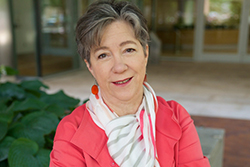
| Vol.
XXIX No.
2 November / December 2016 |
| contents |
| Printable Version |
In Memoriam
Susan L. Lindquist

The following Memorial Resolution was introduced by Professor David Page and passed unanimously at the Institute Faculty Meeting on November 16, 2016.
It is with deep sadness that we record here a memorial resolution marking the passing of Professor Susan L. Lindquist, our valued colleague, collaborator, and friend. Sue passed away on Thursday, October 27, 2016 at the age of 67. A risk-taker and an innovator, Sue’s nearly 40-year career was defined by intellectually courageous, boundary-defying research and a passion for nurturing new generations of scientific talent. She believed that if we were not reaching for things beyond our grasp, we were not doing our job as researchers; if we were not constantly striving for that which we could only imagine, we were not fulfilling our obligations to society as scientists.
Sue had been on the faculty of MIT’s Department of Biology since 2001, the year in which she was appointed Director of Whitehead Institute – becoming one of the first women in the nation to lead a major independent research organization. In 2004, she resumed her research focus as an Institute Member and a Howard Hughes Medical Institute Investigator, as well as an associate member of the Broad Institute and the Koch Institute. Sue was a Professor at the University of Chicago for 23 years prior to coming to Whitehead and MIT. Before joining the Chicago faculty, she earned an undergraduate degree in microbiology from the University of Illinois at Urbana-Champaign and a PhD in biology from Harvard University.
Sue was a highly creative, out-of-the-box scientific thinker who possessed a unique biological intuition for the way things worked and the right questions to ask. She made numerous, invaluable contributions to the study of protein folding, demonstrating that alternative protein conformations can have profound and unexpected influences. In particular, her research transformed budding yeast into a model organism for studying human disease, evolution, and biomaterials. She was best known for her work on prions – proteins that exhibit an unusual ability to exist in multiple stable structural states, with altered functions depending on the state. Using yeast, she and her colleagues demonstrated that prions have the capacity to drive change in an organism’s inherited characteristics without changing its DNA or RNA – relying instead on an ability to change how proteins fold. In a seminal breakthrough in evolutionary biology, her laboratory showed that prions can help activate many previously hidden biophysical interactions, producing new traits that are passed on to subsequent generations. In other words, by uncovering previously hidden genetic variation that can help cells survive changes in their environment, prions provide a mechanism for the evolution of beneficial new traits.
One of the nation’s most lauded scientists, Sue received the President’s National Medal of Science, as well as the Dickson Prize in Medicine, the Otto-Warburg Prize, the Genetics Society of America Medal, the Vanderbilt Prize for Women’s Excellence in Science and Mentorship, and many other awards. She was elected as a member of the National Academy of Sciences, the National Academy of Medicine, the American Philosophical Society, the American Academy of Arts and Sciences, and the British Royal Society.
Sue was not only a superb basic scientist, but also a caring and committed mentor, an extraordinary role model for women in science, a generous colleague, and a supportive friend. We remember her loving and generous personality, her humor, her creative spirit and her tango dancing at the Whitehead Institute’s annual retreats. She is survived by her beloved tango partner and husband, Edward Buckbee; their two daughters, Nora and Alana; and her two brothers. Our thoughts are with them – and with the members of her lab, who she treated as family.
For these reasons, and in recognition of how much Sue meant to us, professionally and personally: Be it resolved that the Faculty of the Massachusetts Institute of Technology, at its meeting of November 16, 2016, records its profound sense of loss on the death of our beloved friend and colleague, Susan Lindquist, and expresses its deepest sympathy to her family, her colleagues, and her friends throughout the science community.
| Back to top | |
| Send your comments |
| home this issue archives editorial board contact us faculty website |